A week after Israel, the United Arab Emirates and Bahrain signed the landmark Abraham Accords agreement, U.S. Secretary of State Mike Pompeo discusses the treaty's economic and security impact on the region as well as the new American snapback sanctions on Iran.
Pompeo expresses the belief that America’s allies will come around to supporting the U.S. call for pressure on the Islamic Republic and highlights what he says is the importance of the Middle East and Israel to the American people.
6 View gallery
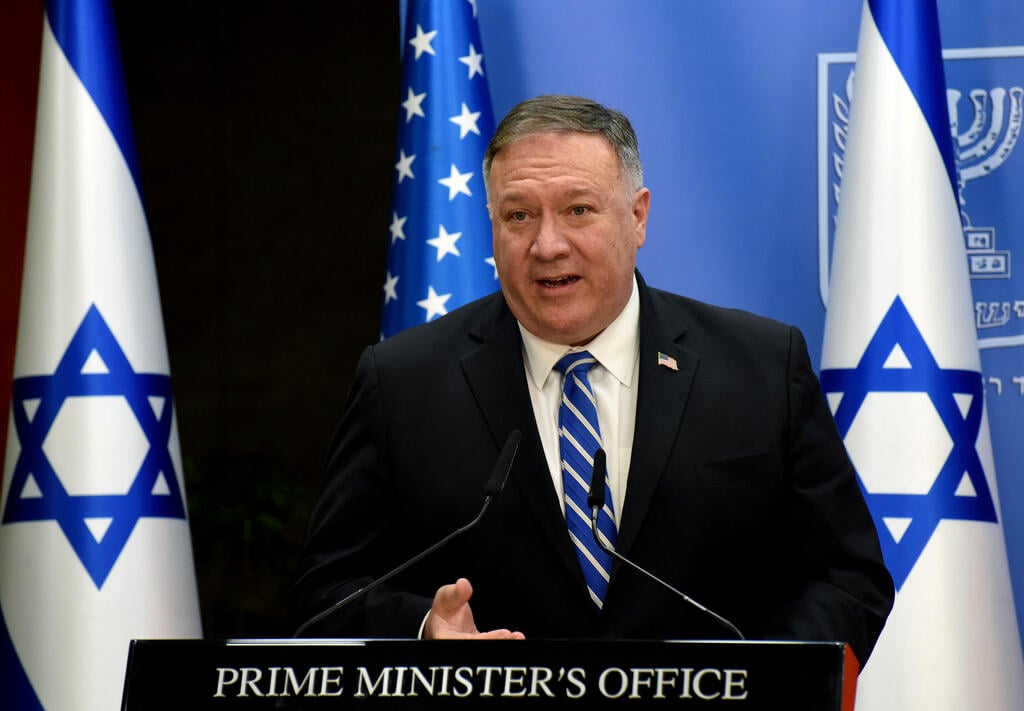

U.S. Secretary of State Mike Pompeo speaking to reporters in Jerusalem in August
(Photo: Reuters)
Virtually all of the stories that we are reporting relative to the security and safety of the Middle East share a common antagonist – Iran. The Abraham Accord is the classic overnight success that took forever. The Trump plan had been to create bilateral agreements with Israel leaving the Palestinians to join or be left behind. What made it work?
Pompeo: We’ve been working on this now for almost four years where President Trump has laid down a very different understanding about creating a security for the Middle East, frankly for the Arab world.
We did two things to change the course and give the opportunity for Arab leaders to make good decisions. The first was we flipped the script and recognized that the central challenge in the Middle East wasn’t the conflict between Israel and the Palestinians but rather the challenge that was presented by the Islamic Republic of Iran and their anti-Semitic terrorist campaign all around the world.
The second thing that enables us was that President Trump has also shown that when we build out coalitions and have partners, whether that’s the Emiratis, the Bahrainis, or our longtime allies, the Israelis, the United States will actually act, will take action.
We won’t just talk about it but we will deliver in support of our friends, whether that was taking down [Iranian general] Qasem Soleimani or the decision to move the U.S. Embassy to its rightful place in Jerusalem, President Trump has demonstrated real resolve behind the words of the commitment and I think that gave confidence to the Arab states that this was the right thing to do.
We’re really happy with what’s taken place so far and we’re optimistic that good things will continue to happen.
6 View gallery
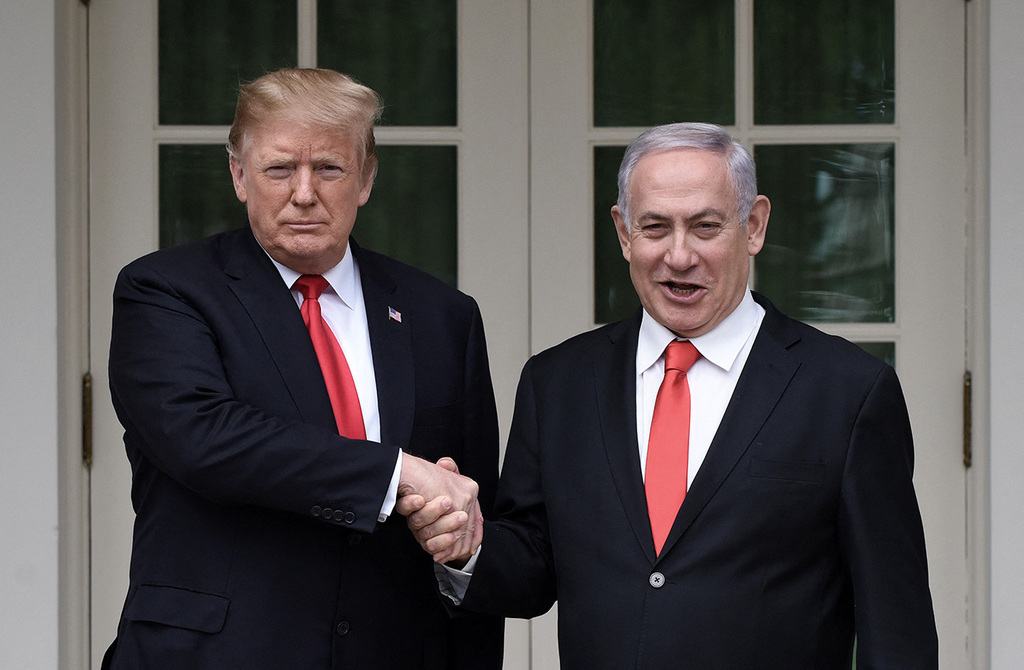

U.S. President Donald Trump and Prime Minister Benjamin Netanyahu meeting at the White House last year
(Photo: MCT)
What many believe stymied the Oslo Accords was that the agreements’ details would be filled in only after the White House ceremony. We’ve had the Abraham [Accords] ceremony. What still needs to be established?
Pompeo: So there’s still work to do to develop a relationship to make sure that these two countries can in fact [have ties], and importantly the people between these two countries execute on the commitment.
And we’ve seen really great signs so far as someone told me the other day that within hours of the signing of the accords, that LinkedIn messages between the United Arab Emirates and Israel literally just about broke the system. This is a good sign.
These are pent-up demands for people who whether they are Jewish or Muslim or Christian, understand that the world is a better place when Israel and the countries in the Middle East can work together – on economic matters, on security matters – all of the things that make the world and the region a better place.
Declaring Israeli sovereignty over Jerusalem and the Golan Heights [as well as] moving the U.S. Embassy to Jerusalem – each act was supposed to cause the region to melt down but it didn’t, not even in the days following the announcements. Why is that?
Pompeo: It’s been a long time that that foreign policy establishment, frankly not just in Washington but around the world, is understanding which if you move a piece of the puzzle there that you would have serious violence and enormous repercussions throughout the region.
President Trump came to understand that, rather than being the problem, that moving the embassy and establishing the Golan Heights and the State Departments decision to recognize that not every settlement was unlawful, those solutions … it took away excuses, if you will, from those who said we want to hide behind this idea of the Palestinians and the Israelis getting together before we do anything.
We took away that condition and I think what that has enabled is everyone to recognize that Israel can be a good partner, economic and security.
In August, you notified the United Nations Security Council of Tehran’s breaches of its commitments to JCPOA, the Iranian nuclear agreement. And over the weekend, as the statutory notification period lapsed, you announced the implementation of the snapback provision re-establishing previous sanctions. But the U.S. appears to be alone in its reliance on that provision or even its legitimacy. How will you enforce it when America’s closest allies are siding with Iran?
Pompeo: [It] is very unfortunate that the French, the Germans and the United Kingdom have all chosen not to stand with us for what’s right, which is to make sure that Iran never has the capacity to buy and sell weapons systems and create wealth and foment terror. We’re deeply disappointed.
It’s been their long-term policy with respect to the dangerous nuclear deal that they want to stand by it. We think this creates now more risk but I don’t actually think that we’re alone.
I think there’s a whole lot of countries that understand this risk. They’re happy the United States has done what we have done. They may not be able to admit it publicly but even those European countries know that the world is safer and, in fact, their people are safer without Iran being able to buy and sell weapons.
So, at the UN, we will have a number of countries who are with us. The GCC issued a statement in support of what we’ve done at the United Nations and the United States will always do the right thing.
We know this is the right thing. We have the authority to execute the fact that we’ve now done so, and we’ll use every tool in America in its diplomatic arsenal to ensure that those new UN Security Council resolutions that have now snapped back will be enforced.
I’m confident, frankly, that companies all around the world will understand the risk of violating those UN Security Council resolutions and they will comply with them.
6 View gallery
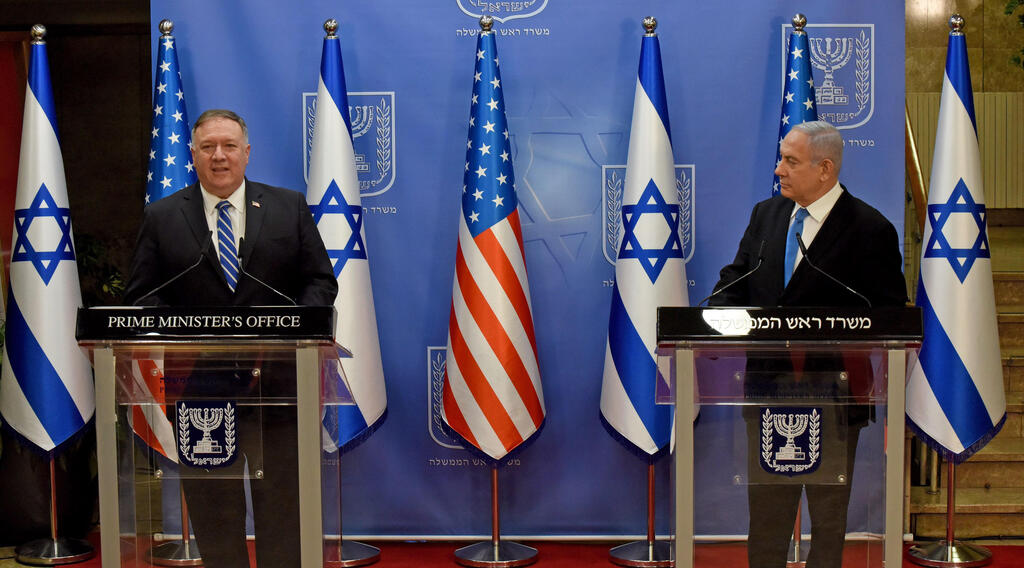

U.S. Secretary of State Mike Pompeo and Prime Minister Benjamin Netanyahu make a joint statement to the press after meeting in Jerusalem in August
(Photo: AFP)
Do you see a realistic possibility that U.S. allies will reverse their stance and support the American position on snapback, and if not, what’s Plan B?
Pompeo: I do think that the capacity for the United States to be a part of a coalition that enforces UN Security Council resolutions is real and that we’ll be successful in that.
As for what their governments will choose, I hope the people in these countries will all come to see that their governments got this wrong. Standing by the Iranians, trying to stay in this deal, that the Iranians are clearly in gross violation of today – a nation, a regime that has now got 40 years of terror. [It] has conducted terror campaigns throughout the world.
I’ll give you another example. You know, [French] President [Emmanuel] Macron is working hard to achieve a good outcome in Lebanon, and we support him on that, but at the same time, France is now going to allow Iran to become wealthier, to have weapons that will fall into the hands of Hezbollah, creating a real risk for the Lebanese people.
It is very difficult to hold both of these spots in your head at the same time. And we do hope, we do hope that the leaders of these countries will come to see that Iran presents a risk that is worthy to continue to enforce these Security Council resolutions again.
6 View gallery
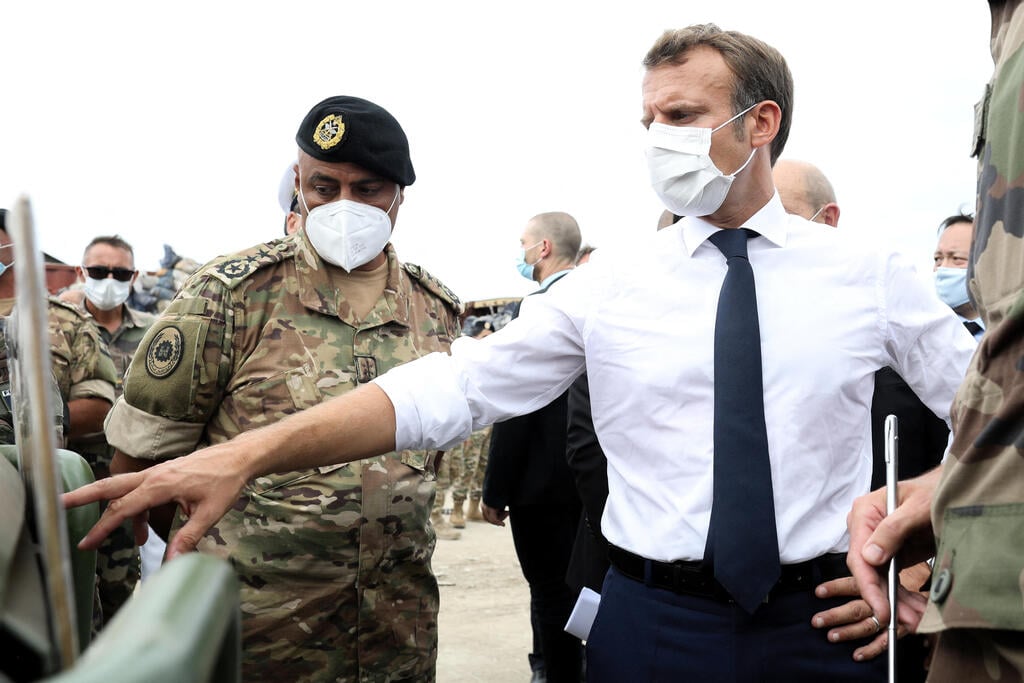

French President Emmanuel Macron visits Beirut port in September, a month after the devastating blast at the site
(Photo: Reuters)
Many pundits believe Iran and even U.S. allies are playing a waiting game until after the American election. If [Democratic nominee and former vice president] Joe Biden wins, how much of the Trump achievements vis-à-vis the Islamic Republic [of Iran] are in jeopardy?
Pompeo: The good news on this front is that there is enormous bipartisan support for what it is the Trump Administration has done.
In fact, it’s been maybe five or six weeks now [since] I received a letter from hundreds of members of Congress from across every part of the American political spectrum, all of whom demanded that the United States act in a way that would not allow Iran to have the capacity to buy and sell weapons.
We’ve now done that. So, I think there’s enormous support from both parties. I hope that if the president, President Trump is not re-elected that the team that comes in under President Biden would come to understand the threat in the same way we do and would continue to make sure that America and Israel are safe.
You spoke about the overhaul on LinkedIn. And wouldn’t the people-to-people actions continue even if President Trump didn’t win reelection?
Pompeo: Oh yes, I believe now that this is on the trajectory that is likely to sustain itself regardless of political leadership in any one country.
I think people in each of these countries have come to understand that Israel doesn’t present a threat to these Arab states and these Arab states understand that it is an important relationship and Israel is here to stay and they have now rightfully recognized it and so I do think you’ll see a building in commerce, and trade and security relationships built out which will make a sustainable model and one that we hope other countries will join.
We hope the Abraham Accords provide a foundation – a legal, diplomatic, moral foundation for other leaders to do the right thing to recognize Israel and begin to develop an economic relationship with it.
6 View gallery
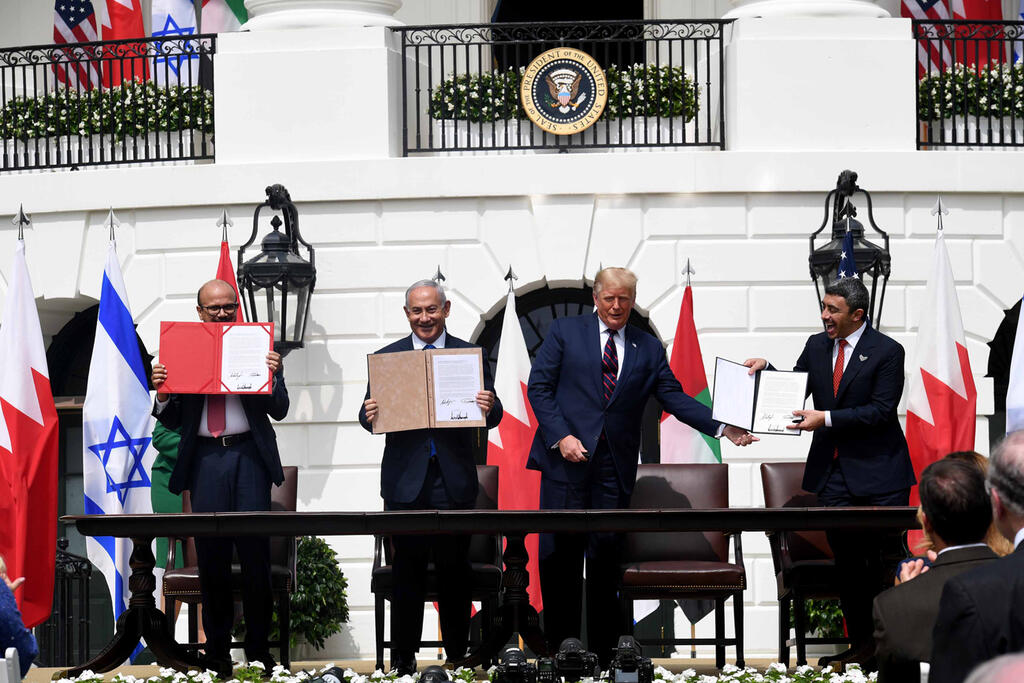

L-R: Bahraini FM Abdullatif Alzayani, PM Benjamin Netanyahu, U.S. President Donald Trump and Emirati FM Abdullah bin Zayed Al Nahyan at the White House signing ceremony
(Photo: GPO)
Honduras just announced it’s opening its embassy in Jerusalem, and vice versa... Do you see others following suit and possibly could you name any in mind?
Pompeo: We think there are many others. I don’t want to get out in front of leaders who are working inside their own countries to make positions, but we’ve been pretty transparent that we’ve been working with countries in Africa, countries in Central America, countries in all parts of the world to build out what we think is a long time coming and is the right time for these leaders now to make the right decisions.
Critics of the president insist the ongoing draw down of troops in the Middle East cause a loss of confidence in American reliability. What has your experience been?
Pompeo: I continue to hear that America is withdrawing, that we’re disengaging, that we’re losing influence, and yet you see the Abraham Accords, which I think belie that. It’s not, in the end, just about actual numbers. You know, we still have significant capabilities. We still have a commitment to keeping the Straits of Hormuz open.
The United States continues to stand with our Arab partners. We’ll do that. We’ll make force adjustments along the way. We’ve done that over many, many years. We’ll make sure we have the configuration right.
The objective isn’t to be present. The objective is to be sure that we provide security assurances in a way that delivers outcomes that the people in that region need. And the efforts to make, to deny Iran money and wealth are at the center of ensuring that stability is ever increasing.
6 View gallery
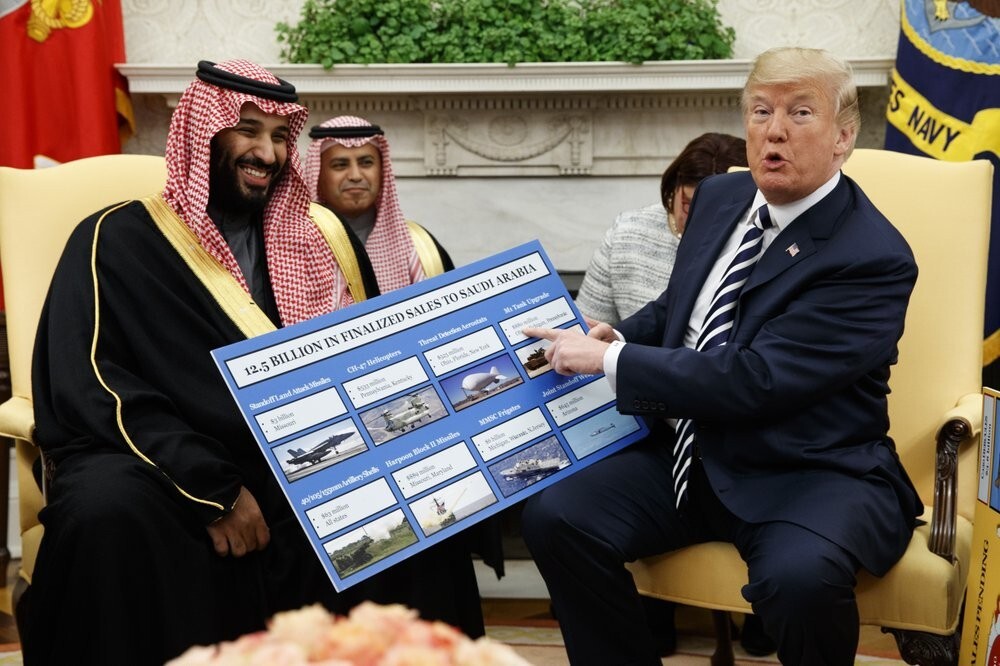

U.S. President Donald Trump shows off arms sales to Saudi Arabia during a meeting with Saudi Crown Prince Mohammed bin Salman in the Oval Office
(Photo: AP)
Middle East countries and entities have played a significant role in U.S. foreign policy from Lebanon to Egypt, Gaza, to Afghanistan and Pakistan, Iraq … the list goes on. Why is it that the Middle East should be important to Americans?
Pompeo: We have a good, important ally and partner in Israel. These are people who we have long had relationships with the benefit not only by American security support, but we benefit from support from these nations as well.
There are so many reasons that those regions matter to the world. And today, you can see China continuing to try to exert its influence in the region. The United States and its security presence there are important to the American people.

